The Geography of Belonging
We don’t always recognize home when we find it.

The first time I met the cat, I didn’t know he would stay. He was just a shape in the periphery – a flash of black and white fur, a bob tail, a curious eye – one of those creatures who lives on the borders of things, belonging to no one, seen but not gathered in.
And yet somehow, without our quite noticing, he moved closer. First the porch. Then the doorway. Then one morning we woke to find that he was already part of us. The children gave him a name -- Oreo Bob, for his colors and bobtail -- and from that moment on, he was no longer just a stray. He was ours. Or rather, we were his.
I’m not writing about a cat, of course. I’m writing about something far more elusive: the moment when we move from being strangers in the world to being claimed, known, and -- most mysteriously of all -- understood. I’m writing about Kenyon and a reunion that is not so much a return to geography as a return to the people who have been, all along, our quiet compass.
The word “reunion” itself carries within it the trace of something lost, then found. To reunite is to gather what has drifted apart. And that is what happens when we return to Kenyon -- or Gambier -- or The Hill, or whatever private shorthand we use for the place that first taught us who we were.
I arrived on that hilltop in the autumn of 1996 as one does when stepping into the unknown: unshaped, uncertain, a little unmoored. I was, in every sense, a stray. I wasn’t looking for a home. I was looking for something much more difficult to name: a self.
I barely knew what questions to ask, let alone what answers to seek. I looked twelve. I felt twelve. I carried, as so many of us do, the tender bewilderment of those for whom the world has always been safe but narrow. I came lacking any real sense of belonging to any group. It was in this small, unlikely village in Ohio that I first began the long, unsteady journey of finding my people.
We don’t always recognize home when we find it. Sometimes it looks like a dorm room in Gund where the door is always open, where laughter comes in through the windows at midnight. Sometimes it looks like a stranger who, by the alchemy of time and shared experience, becomes someone you can call at 3 a.m. decades later. Sometimes it looks like the face of someone you love who makes you feel, for the first time, not invisible.
Looking back now, it wasn’t the classes or the grades or the rituals of campus life that truly formed me. It was the bonds. The unexpected, accidental gathering of people who, without fanfare, became the ones who would stand in the background of my life forever. Some I met in those years on The Hill. Some I met later, in faraway cities, but instantly recognized by the same invisible thread that ties Kenyon people together: the shorthand, the humor, the shared sensibilities and curiosities of those who’ve walked the same narrow paths and looked out across the same golden fields.
And this is the quiet miracle of it: that these bonds don’t loosen with time. They deepen. They expand. They make room for new versions of ourselves.
When we return -- to the bookstore, to the halls of Peirce, to the lawn where we once dreamed aloud -- it is not nostalgia we are chasing, though nostalgia has its own sweet pull. It is something rarer: the chance to see ourselves reflected in the eyes of those who have known us since a pivotal turning. To be understood, not in the polished way we present ourselves to the world now, but in the raw, essential way we once were. And perhaps still are.
It is a rare thing, in this restless world, to find one’s people. Rarer still to keep them. Most of life is made of temporary crossings -- faces glimpsed, names forgotten, moments that pass like weather. But when we are lucky, we are claimed, as the stray cat claimed us -- not by demand, but by quiet belonging. We are seen, yes. We are heard. But more importantly, we are understood.
And so we return. Not because we need to relive the past, but because in the company of these friends -- our people -- we are able to gather up the many versions of ourselves we have been, and hold them together in one place. We are, for a brief shining moment, whole.
And it is good to come home.



